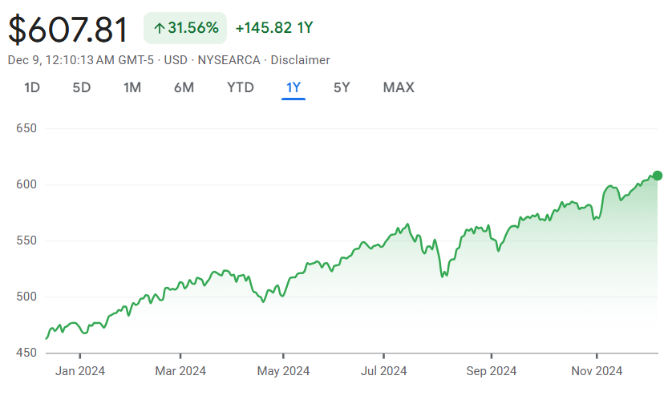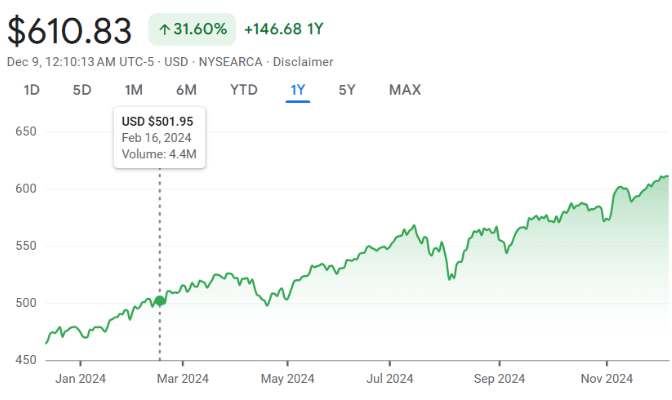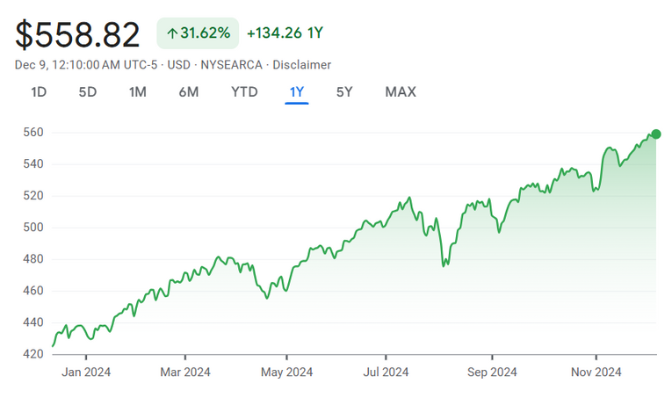What is in the S&P 500?
The S&P 500 stock market index includes approximately 500 of the largest U.S. companies in the technology, healthcare, finance, and consumer products sectors. The S&P 500 is market-capitalization-weighted, so large businesses like Apple have a greater impact on the index's performance than smaller businesses. The market index is often said to be the "health" of the U.S. stock market, making it a very popular investment for people to have a broad exposure to large cap index.
Why Are S&P 500 Index Funds Popular?
S&P 500 index funds are popular because they are simple and provide instant diversification. Individual stocks purchase can be minimized by investing in a single fund, providing access to the 500 largest U.S. companies. These index funds are often less expense ratios than actively managed funds and thus eliminate higher management fees.
Historically, the S&P 500 index fund has provided an average annual total return of around 10% over the last 80 years, providing a conservative and stable option for long-term investing in the stock markets. Furthermore, it also eliminates the need to research individual stock selection and allows investors to track a broad index without heavy analysis.
Get the Latest Stock Market Insights for Free with
Stocks Down Under & Pitt Street Research
Join our newsletter and receive exclusive insights, market trends, investment tips, and updates delivered directly to your inbox. Don't miss out – subscribe today and make informed investment decisions.
3 Best S&P 500 Index Funds to Invest in 2025

SPDR S&P 500 ETF (SPY)
SPDR S&P 500 ETF is a top choice for investors looking to invest in the S&P 500 Index. The fund provides exposure to large-cap stocks in a broad portfolio of U.S. companies. Its low-cost structure and competitive expense ratio make it ideal for long-term investing. SPY has demonstrated strong past performance, reflecting the S&P 500 market. The fund’s expenses are kept low, benefiting investors seeking growth without high management fees.

iShares Core S&P 500 ETF (IVV)
iShares Core S&P 500 ETF offers investors access to a diversified portfolio of large companies with a very low expense ratio. By investing in this fund, you mirror the performance of the S&P 500 Index, making it ideal for long-term investing. IVV is one of the most cost-effective 500 funds available, with consistently solid past performance. Investors can benefit from low fund expenses, making it a strong choice in the current market.

Vanguard S&P 500 ETF (VOO)
Vanguard S&P 500 ETF provides investors with low-cost exposure to the S&P 500 Index. It tracks 500 of the largest companies in the U.S., offering a broad market portfolio. VOO’s strong past performance, coupled with its low management fees and fund expenses, makes it ideal for long-term investing. Investors can trust the fund’s performance, which mirrors the S&P 500, making it a reliable choice for those seeking exposure to large companies at a low cost.
3 Best S&P 500 Index Funds to Invest in 2025
How to Choose an S&P 500 Index Fund
If you're looking for an S&P 500 index fund, the most important things to consider include the minimum investment, expense ratio, the fund's inception date, and past performance. Expense ratio greatly reduce your costs over the long term. For example, the lowest management fees are often found in funds like the Vanguard Fund and Fidelity's 500 Index Fund.
When deciding how to align the fund within your overall investment strategy, be sure to also take into account fund's inception date and historical performance data. Finally, make sure your fund aligns with your investment strategy, whether that's capital growth, capital return and reasonable income distribution, or some other combination.
How to Invest in S&P 500 Index Funds
When choosing a brokerage account to invest in S&P 500 index funds, evaluate options based on their expense ratios, fund assets, and minimum investment requirements. A brokerage with low fees and a diversified portfolio will certainly reduce costs when investing over the long term.
A look at fund's past performance records over time and noting the date of origin can provide evidence about its reliability. Finally, make sure your fund aligns with your investment strategy—if your primary goal is capital growth or if you need capital returns and appropriate income distributions, or a combination of both.
S&P 500 Index Funds vs. S&P 500 ETFs
Although they are the same index, S&P 500 index funds vs. exchange traded funds are very different. The mechanism of their trading and fee structures are certainly not the same. For example, most ETFs can be traded throughout the day, so they are best suited for active traders.
In contrast, you can trade index funds only when the market is closed. Additionally, ETFs tend to have lower expense ratio than mutual funds, which makes them attractive to those who prioritize low trading costs. When investing in an S&P 500 index fund or ETF, consider your preferred trading mechanism and whether you are sensitive to the trading cost per transaction (ETF).
Is an S&P 500 Index Fund a Good Investment?
Overall, an S&P 500 index fund or ETF is a good long-term investment for any average investor. They are instantly diversified as their portfolio consists of the 500 largest U.S. companies. Although there may be instances of minor fluctuations or losses at some point in time, the S&P 500 has been relatively predictable in its overall returns and has averaged around 10 percent in annual long-term returns.
Everyone knows that "no investment is risk-free", but an index fund/ETF offers lower fees and reliable return expectations than an actively managed fund. Likewise, S&P 500 index funds and ETFs offer lower trading costs and tax efficiency over the long term than actively managed funds, which is what investors want from active trading. Overall, S&P 500 index funds and ETFs are very popular today due to their low-cost structure and historically good returns for investing over the long term.
FAQs on Investing in S&P 500 Index Funds
The S&P 500 is one of the most trusted and respected indexes to invest in for the long term due to it investing in 500 large U.S. companies from a variety of sectors. While the S&P 500 index is one of the best indexes one can invest in, it all depends on what your financial objective is. Other indexes such as the NASDAQ-100 index may generate better growth rates in the short term depending on the concentration of technology companies in the portfolio.
Our Analysis on S&P 500 Index Funds
Australian Clinical Labs (ASX:ACL) The Statutory Hit Spooked Investors
Australian Clinical Labs fell 10% today after revenue went slightly backwards, even though underlying profit improved. The key nuance is…
Eden Innovations (ASX:EDE) Up 30% on a Debt Free Reset, But Dilution Is the Price
$2.2m Loan Converts, Balance Sheet Clears, Shares Reprice Eden Innovations surged 30% today to 24.5c after announcing it has converted…
Fortif AI (ASX:FTI) The Agentic AI “Data Plane” Behind the Models
The Real AI Bottleneck Is Data, Not Models Fortif AI Fortif AI surged 14% to 32c this morning after announcing…
Here are some ASX stocks that will benefit from a higher AUD, and stocks that will lose
The Aussie dollar has been surging in recent weeks and there are ASX stocks that will benefit from a higher…
Banks Smashed It, Healthcare Got Destroyed, Can BHP and Rio Tinto Keep the ASX Rally Alive This Week?
Earnings Week: Can BHP and Rio Keep the ASX Rally Alive? Last week’s ASX rally proved one thing beyond doubt:…





